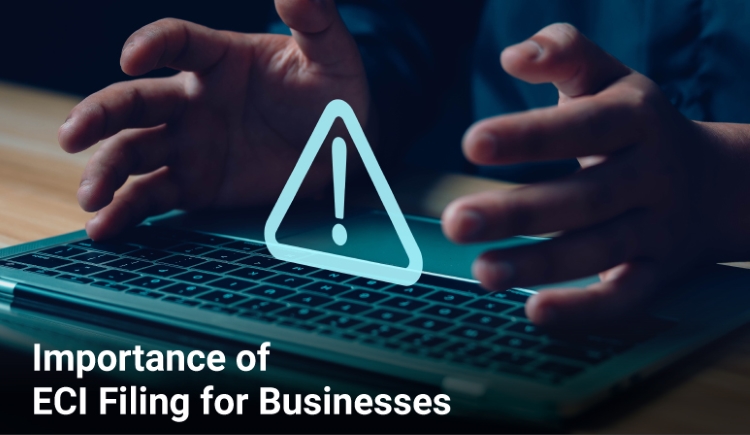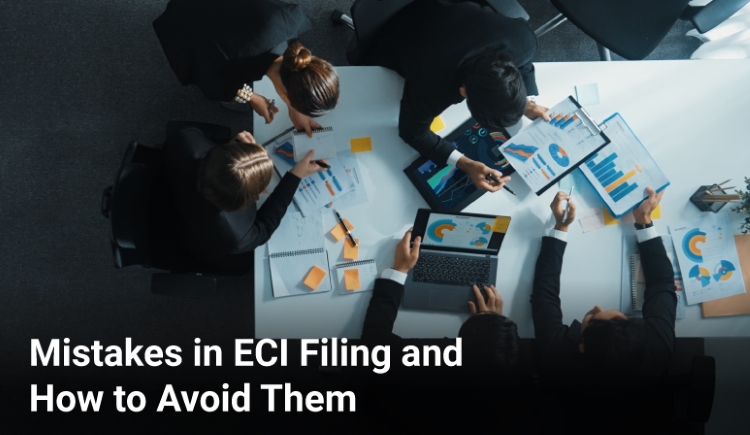Singapore could be the global hub for trade and back, promoting an environment that makes it easy for companies to grow. One important aspect of maintaining a business in Singapore is knowledge and compliance with tax obligations, including filing of Estimated Chargeable Income. This paper will explore what ECI is, the importance of filing ECI for businesses, requirements for filing ECI, preparation for filing ECI, and common mistakes to avoid.
What is ECI?

What is ECI?
ECI stands for Estimated Chargeable Income. It is an estimated amount of the taxable income of a company in any financial year, net of allowable deductions. Every company in Singapore is required to submit the ECI to the Inland Revenue Authority of Singapore within three months from the close of its financial year. It is a declaration that is put forward so that tax compliance may be checked and the IRAS may view the tax risk of a company effectively.
Importance of ECI Filing for Businesses

Importance of ECI Filing for Businesses
ECI could be mandated for businesses in Singapore as a general requirement for some reasons:
- Tax Controls Compliance: Filing ECI may be a requirement of the Pay Assess Act. Therefore, if it is not completed, it will attract penalties and interest charges that may prove detrimental to any company's financial health and reputation.
- Cash Flow Management: With ECI filing, businesses can better manage the cash flow. IRAS provides an option for paying taxes by installments, which helps businesses reduce the financial stress.
- Timely Assessment: ECI recording enables IRAS to perform convenient evaluations of charge liabilities, reducing the hazard of disparity and guaranteeing that businesses are mindful of their budgetary commitments.
- Key Planning: Knowing and assessing chargeable wage makes a difference to businesses with key monetary arranging. It permits companies to anticipate charging liabilities and finally allocate resources effectively.
ECI Filing Requirements
The ECI recording requirements in Singapore may be quite simple but are very important to be acknowledged with respect to compliance:
- Due date: A company has to file its ECI within 3 months from the company's fiscal year-end. For example, if a company's financial year closes on 31st December, then it is required to file the ECI by 31st of the month of March of calendar year.
- Mandatory Filing Every company is required to file its ECI unless it qualifies for the concessionary exemption provided to companies whose annual income does not exceed S$5 million and whose ECI for the basis year is nil.
- ECI has to be filed online through the IRAS myTax Portal. It, therefore, defines the electronic submission methodology; in turn, this would help reduce unnecessary paperwork and avoid errors that sometimes result from a manual process of return preparation.
Preparation for ECI Filing
Properly planned ECI recording can help service enterprises avoid mistakes and thus act according to the law.
- Record-keeping: Proper and updated records with regard to your financial information are very essential. This will include the statement of income, balance sheets, and keeping record on tax-allowable expenses.
- Interpreting ASSESS Results—Understand What Comprises Tax Deductible Expenses and Conclusions. In this regard, cost classification may impact the ECI calculation to a large extent.
- Accounting Software: The accounting packages are to be used, which will keep records of money flows and automate its calculation. This may avoid human chances of error with perfect detailing.
- Consultation of Experts: Consult charge experts or consultants to have master consultation regarding ECI recording. Their expertise could help in the picking up of potential problems and designing the best charge planning.
Mistakes in ECI Filing and How to Avoid Them

Mistakes in ECI Filing and How to Avoid Them
Errors in ECI filing can result in penalties and financial implications. Following are some of the common mistakes with tips on how one can avoid them:
- Late Filing: There are penalties assessed against one if the deadline of filing is missed. Set up reminders and plan accordingly in order to file on time.
- Wrong income estimation: Overstatement or understatement of income may result in incorrect estimations for the taxes. Carefully review all the financial records, and if need be, consult a professional.
- Ignore Allowable Deductions: Not claiming allowable deductions increases tax liabilities. Know the eligible deductions and ensure that they get factored into the ECI calculation.
- IRAS Updating: The tax laws and requirements change from time to time. Be abreast of any updates or adjustment from IRAS that may impact ECI filing.
Conclusion
ECI filing may be an imperative requirement for any business in Singapore. It ensures adherence to tax directions and assists in financial planning. At the same time, understanding the process of ECI filing, preparing enough, and avoiding common mistakes enable businesses to manage their obligations with taxes effectively in order to get involved in growth and success in the State of Singapore, which is highly vibrant in economic terms.



